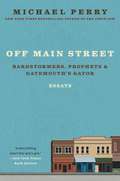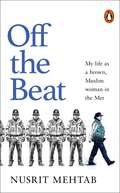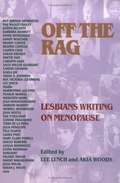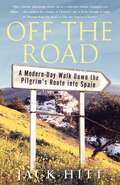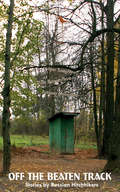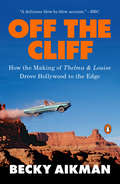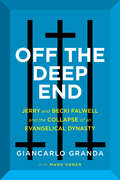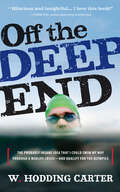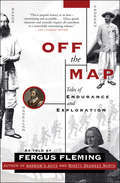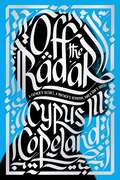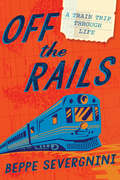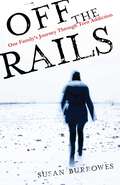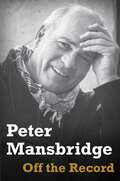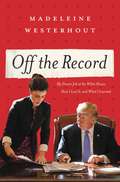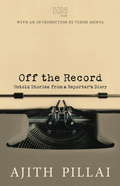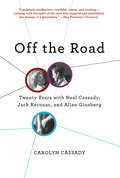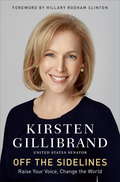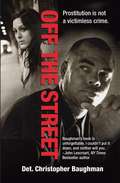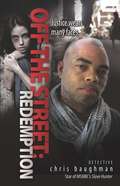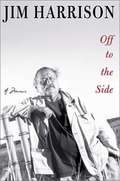- Table View
- List View
Off Main Street: Barnstormers, Prophets, and Gatemouth's Gator
by Michael PerryWhether he's fighting fires, passing a kidney stone, hammering down I-80 in an 18-wheeler, or meditating on the relationship between cowboys and God, Michael Perry draws on his rural roots and footloose past to write from a perspective that merges the local with the global. Ranging across subjects as diverse as lot lizards, Klan wizards, and small-town funerals, Perry's writing in this wise and witty collection of essays balances earthiness with poetry, kinetics with contemplation, and is regularly salted with his unique brand of humor.
Off The Beat: My life as a brown, Muslim woman in the Met
by Nusrit MehtabIf you can’t change a system from the inside, you have no choice but to try and change it from the outside. That act starts with telling my own story as a brown Muslim woman in the Met.'A devastating critique of the Met' Mail on Sunday'Nusrit Mehtab has gone through the Met like a force of nature…Her story is one worth reading.’HH Wendy Joseph KC, author of Unlawful Killings‘Off The Beat lifts the filthy carpets at the Met Police and shines a light on the darkness below. Gripping, fascinating and crucial to the future of UK policing.’Alice Vinten, author of On the Line.‘A disturbing account of institutionalised sexism and racism in the Metropolitan police told from the perspective of a tough and fiercely ambitious officer who strove to rise up through the ranks’Harriet Wistrich, author of Sister in LawWhen Nusrit Mehtab joined the Metropolitan Police, the organization was rife with racism and misogyny. Officers refused to patrol with her, or even call her by her name. Her attempts to get promoted were met with hostility and ridicule, and she was subjected to cruel pranks.As the years passed and her seniority grew, Nusrit was dismayed to find that these problems got worse, not better. In this searing memoir, she recounts her thirty years in the Met and the appalling treatment she endured. Now lecturing young recruits in criminology and mentoring BAME officers, Nusrit is confident that we can mould the next generation to create a more inclusive police force, safer for both the officers and the public.Full of deeply shocking stories from the heart of the organization, Off the Beat shines a light on an institution that has lost sight of its mission to protect us and pleads the case for a brighter and safer future.
Off The Planet
by Jerry M. LinengerOn January 12, 1997, Jerry Linenger took off aboard the Space Shuttle Atlantis, en route to an historic 132-day rendezvous with the Russian Space Station Mir. Not since Apollo 13 has an American astronaut Jerry Linenger tells how he became an astronaut and then a cosmonaut. While sharing his own life adventures, he also lets us glimpse what it is like to participate in both the American and Russian space programs. Fast paced; filled with real adventure. faced so many catastrophic malfunctions and life-threatening emergencies in one missionand lived to tell about it.
Off The Rag: lesbians writing on menopause
by Lee Lynch Akia WoodsMost books about menopause are either medically based or heterosexually focussed. This volume has many short pieces written by lesbians, about menopause from a lesbian perspective. It was published in 1996, but is still [a] valid and excellent resource. A large bibliography is included.
Off The Road: A Modern-Day Walk Down the Pilgrim's Route into Spain
by Jack HittWhen Jack Hitt set out to walk the 500 miles from France to Santiago de Compostela, Spain, he submitted to the rigorous traditions of Europe's oldest form of packaged tour, a pilgrimage that has been walked by millions in the history of Christendom. Off the Roadis an unforgettable exploration of the sites that people believe God once touched: the strange fortress said to contain the real secret Adam learned when he bit into the apple; the sites associated with the murderous monks known as the Knights Templar; and the places housing relics ranging from a vial of the Virgin Mary's milk to a sheet of Saint Bartholomew's skin. Along the way, Jack Hitt finds himself persevering by day and bunking down by night with an unlikely and colorful cast of fellow pilgrims -- a Flemish film crew, a drunken gypsy, a draconian Belgian air force officer, a man who speaks no languages, a one-legged pilgrim, and a Welsh family with a mule. In the day-to-day grind of walking under a hot Spanish sun, Jack Hitt and his cohorts not only find occasional good meals and dry shelter but they also stumble upon some fresh ideas about old-time zealotry and modern belief. Off the Roadis an engaging and witty travel memoir of an offbeat journey through history that turns into a provocative rethinking of the past.
Off the Beaten Tracks: Stories by Russian Hitchhikers
by Irina Bogatyreva Igor Savelyev Tatiana MazepinaThese stories take the reader along the endless roads of central Russia, the Urals, the Altai, Siberia, and beyond. In energetic and vivid prose they depict all sorts of curious Russian types: exotic adventures in far-flung places, the complex psychological relationships that develop on the road, and these hitchhikers' inexplicable passion for tramping.<P><P> "In via veritas" is their motto. The authors are all winners of the Debut Prize, and will present the book at BEA in 2012 in New York.Irina Bogatyreva lives in Moscow. She has won several prizes, including the Debut, for her novel AUTO-STOP. She has several published books to her credit.Tatiana Mazepina is the latest Debut Prize winner. She is a member of the Society of Free Travellers. She works as a journalist and writes on religious matters.Igor Savelyev lives in Ufa (Bashkiria) where he works as a crime reporter. He is the winner of the Debut Prize and several other prizes.
Off the Cliff: How the Making of Thelma & Louise Drove Hollywood to the Edge
by Becky AikmanA lively and revealing behind-the-scenes look at the making of one of history's most controversial and influential movies, drawing on exclusive interviews with the cast and crew.“You’ve always been crazy,” says Louise to Thelma, shortly after she locks a police officer in the trunk of his car. “This is just the first chance you’ve had to express yourself.” In 1991, Thelma & Louise, the story of two outlaw women on the run from their disenchanted lives, was a revelation. Suddenly, a film in which women were, in every sense, behind the wheel. It turned the tables on Hollywood, instantly becoming a classic, and continues to electrify audiences as a cultural statement of defiance. But if the film’s place in history now seems certain, at the time its creation was a long shot. Only through sheer hard work and more than a little good luck did the script end up in the hands of the brilliant English filmmaker Ridley Scott, who saw its huge potential. With Scott on board, a team willing to challenge the odds came together—including the stars Geena Davis and Susan Sarandon and a fresh-faced up-and-coming actor named Brad Pitt, as well as legends like actor Harvey Keitel, composer Hans Zimmer, and old-school studio chief Alan Ladd Jr.—to create one of the most controversial movies of all time. But before icons like Davis and Sarandon got involved, Thelma & Louise was just an idea in the head of Callie Khouri, a thirty-year-old music video production manager, who was fed up with working behind the scenes on sleazy sets. At four a.m. one night, sitting in her car outside the ramshackle bungalow in Santa Monica that she shared with two friends, she had a vision: two women on a crime spree, fleeing their dull and tedious lives—lives like hers—in search of a freedom they had never before been able to realize. But in the late 1980s, Hollywood was dominated by men, both on the screen and behind the scenes. The likelihood of a script by an unheard-of screenwriter starring two women in lead roles actually getting made was remote. But Khouri had one thing going for her—she was so inexperienced she didn't really know she would be attempting the nigh impossible. In Off the Cliff, Becky Aikman tells the full extraordinary story behind this feminist sensation, which crashed through barricades and upended convention. Drawing on 130 exclusive interviews with the key players from this remarkable cast of actors, writers, and filmmakers, Aikman tells an inspiring and important underdog story about creativity, the magic of cinema, and the unjust obstacles that women in Hollywood continue to face to this day.
Off the Deep End: Jerry and Becki Falwell and the Collapse of an Evangelical Dynasty
by Mark Ebner Giancarlo GrandaGiancarlo Granda finally reveals the truth about his relationship with Becki Falwell and her husband Jerry Falwell Jr., and the hidden world of political influence, high finance, and criminal intrigue.Jerry Falwell Jr. is a prominent figure in the evangelical world whose support for presidential candidate Donald J. Trump helped secure Trump's Republican nomination in 2016. He captured headlines when it was revealed that he and his wife Becki had participated in a years-long bizarre sexual relationship with a pool attendant they met at the Fountainbleu Hotel in Miami Beach. As Falwell Jr. began to deny this relationship, even more damaging news came out, ultimately forcing him to resign as president of Liberty University, which many consider to be the largest evangelical Christian university in the world. Giancarlo Granda is now ready to share the story of his years on an "only in America" rollercoaster ride through the monied corridors of power and profound hypocrisy.
Off the Deep End: The Probably Insane Idea That I Could Swim My Way Through A Midlife Crisis - And Qualify For The Olympics
by W. Hodding CarterHodding Carter dreamed of being an Olympian as a kid. He worshipped Mark Spitz, swam his heart out, and just missed qualifying for the Olympic trials in swimming as a college senior. Although he didn't qualify for the 1976, 1980, 1984, 1988, 1992, 1996, 2000, or 2004 Olympics, he never stopped believing he could make it. And despite past failures and the passage of time, Carter began his quest once more at the age of forty-two. Maybe he's crazy. But then again, maybe he's onto something. He entered the Masters Championships. He swam three to four miles each day, six days a week. He pumped iron, trained with former Olympians, and consulted with swimming gurus and medical researchers who taught him that the body doesn't have to age. He swam with sharks (inadvertently) in the Virgin Islands, suffered hypothermia in a relay around Manhattan, and put on fifteen pounds of muscle. Amazingly, he discovered that his heartbeat could keep pace with the best of the younger swimmers'. And each day he felt stronger, swam faster, and became more convinced that he wasn't crazy. This outrageous, courageous chronicle is much more than Carter's race with time to make it to the Olympics. It's the exhilarating story of a man who rebels against middle age the only way he can—by chasing a dream. His article in Outside magazine, on which this book is based, was the winner of a Lowell Thomas award from the Society of American Travel Writers Foundation.
Off the Grid: My Ride from Louisiana to the Panama Canal in an Electric Car
by Randy Denmon Jim MotavalliThe rollicking tale of a first-of-its-kind adventure-driving a Tesla through Central America.Only a week after the nation’s newspapers were filled with headlines of the first cross-country trip in an electric car, two Louisianans slip quietly across the Rio Grande in south Texas in an attempt to do the unthinkable-drive a factory electric car across seven Third World countries to the "end of the road,” Panama City, Panama.Without support and armed only with a toolbox, a bag of electrical adapters, and their wits, author Randy Denmon and his friend Dean trudge on through jungles, deserts, volcanoes, rivers, and crater-sized potholes, all the while trying to avoid the drug cartels and corrupt border guards that could mean a quick end to their adventure . . . and their lives. Through it all, the same enormous problem loomed daily: how to charge the car in such a primitive and desolate setting?Despite the numerous setbacks, Randy never lost his sense of humor. Off the Grid is as much a spiritual journey as a physical one about two guys who dropped everything for one grand twenty-first-century adventure-traveling back in time in a car that seemed to come from the future.
Off the Leash: A Year at the Dog Park
by Matthew GilbertA heartwarming story about a man and his dog, and the first-ever book about dog parks and the part they play in the lives of both humans and canines.Off the Leash is a group portrait of dog people, specifically the strange, wonderful, neurotic, and eccentric dog people who gather at AmoryPark, overlooking Boston near Fenway Park. It’s about author Matthew Gilbert’s transformation into one of those dog people with fur on their jackets, squeaky toys in their hands, and biscuits in their pockets.Gilbert, longtime TV critic at The Boston Globe, describes his reluctant trip into the dog-park subculture, as the first-time owner of a stubbornly social yellow Lab puppy named Toby. Like many Americans, he was tethered to the digital leash. But the headstrong, play-obsessed Toby pulls him to Amory, and Amory becomes an exhilarating does of presence for him. At the dog park, the dog owners go off the leash, too.Dog-park life can be tense. When dogs fight, their owners bare their teeth at each other, too. Amid the rollicking dog play, feelings tend to surface faster, inedited. Amory becomes, for the dog owners, an idyllic microcosm, the home of enduring friendships and romantic crushes. Meeting daily, a gathering of dog owners can be like group therapy.A charming narrative, Off the Leash will appeal to anyone who has ever enjoyed watching a puppy scamper through a park.Praise for Off the Leash“An admitted curmudgeon just a few steps away from Cruella de Vil, Gilbert sees his life change when he falls in love with a dog person and then falls in love with dogs. . . . Gilbert captures with great humor the world within the dog park. . . . Beyond the individual quirks, Gilbert finds community and the ability to empathize among people who on the surface have little in common.” —Los Angeles Times“Gilbert’s book is witty, sweet, and affirming.” —The Boston Globe
Off the Map: Tales of Endurance and Exploration
by Fergus Fleming“A fine and lively collection of exploration stories” from the author of Barrow’s Boys (Kirkus Reviews). On John Franklin’s 1820 expedition to find the Northwest Passage, Michel Teroahaute cannibalized two team members and was preparing a third when he was caught and killed. When Rene La Salle set off for the Mississippi Delta in 1684, he missed the target by five hundred miles, but on landing, immediately built a prison for those who fell asleep on watch. Consummate storyteller Fergus Fleming brings together these and forty-three other gripping stories spanning three ages of exploration in Off the Map. Off the Map recounts episodes both classic and forgotten: The “classics” are brought to life in more vivid colors than ever before; the lesser-known stories offer accounts of extraordinary feats that have long lain hidden. From the Renaissance golden age of Columbus, da Gama, and Magellan, to the twentieth-century heroics of polar explorers such as Peary, Scott, and Amundsen, this is an unforgettable journey into the annals of adventure. “A first-rate one-volume . . . introduction to many hair-raising stories of exploration.” —The New York Times “Each story is short, punchy, and crammed with facts . . . Fleming possesses an eye for wry detail.” —Adventure “There isn’t a dud in the lot . . . Adventure reading of a high order: brisk, fresh and full of color.” —Kirkus Reviews
Off the Radar
by Cyrus CopelandA spy story, a mystery, a father-son heartbreaker: Cyrus Copeland seeks the truth about his father, an American executive arrested in Iran for spying at the time of the 1979 hostage crisis, then put on trial for his life in a Revolutionary Court.As a young boy living in Tehran in 1979, Cyrus Copeland--child of an American father and Iranian mother--never dreamed that his dad, an employee of Westinghouse, would be in danger for his life. That is, until the moment his father was arrested on espionage charges and put on trial in a Revolutionary Court. Almost simultaneously, more than fifty other Americans were taken hostage at the U.S. Embassy by Islamist militants, an event that has recently captivated the world again with the success of the book and film Argo. With the hostage crisis receiving most of the attention from the media and White House, it was largely left to Copeland's mother and family to negotiate his father's reprieve from the firing squad. Now, more than thirty years later, Copeland sets out to find the truth about his father and his role in the Iranian hostage crisis. Was he in fact an intelligence operative--a weapons-system expert--caught red-handed by the Iranian regime, or was he innocent all along? Part mystery, part reportage, and part detective work, Copeland's brilliantly original family epic is a powerful memoir and adventure. From the Hardcover edition.
Off the Radar: A Father's Secret, a Mother's Heroism, and a Son's Quest
by Cyrus CopelandA spy story, a mystery, a father-son heartbreaker: Cyrus Copeland seeks the truth about his father, an American executive arrested in Iran for spying at the time of the 1979 hostage crisis, then put on trial for his life in a Revolutionary Court.As a young boy living in Tehran in 1979, Cyrus Copeland--child of an American father and Iranian mother--never dreamed that his dad, an employee of Westinghouse, would be in danger for his life. That is, until the moment his father was arrested on espionage charges and put on trial in a Revolutionary Court. Almost simultaneously, more than fifty other Americans were taken hostage at the U.S. Embassy by Islamist militants, an event that has recently captivated the world again with the success of the book and film Argo. With the hostage crisis receiving most of the attention from the media and White House, it was largely left to Copeland's mother and family to negotiate his father's reprieve from the firing squad. Now, more than thirty years later, Copeland sets out to find the truth about his father and his role in the Iranian hostage crisis. Was he in fact an intelligence operative--a weapons-system expert--caught red-handed by the Iranian regime, or was he innocent all along? Part mystery, part reportage, and part detective work, Copeland's brilliantly original family epic is a powerful memoir and adventure. From the Hardcover edition.
Off the Rails: A Train Trip Through Life
by Beppe SevergniniIn this witty and entertaining collection of travel tales, an acclaimed journalist explores his obsession with trains--and what his rail journeys have taught him about culture and identity."I've gone around the world in installments. Every trip has been a revelation. I've watched regions, nations, and continents change moods and I've met more people on trains than in forty years of airplane flights. Every train trip has been a spectacle. Trains are stages, cafés, bazaars. The only talk show that will never go off the air..."Beppe Severgnini has spent his life traveling the world, and not just because he's a journalist; he's a passionate, unflagging train buff. Off the Rails recounts some of his favorite trips across Europe, Australia, Asia, and the United States, each journey bringing readers not only to a different place but to a different time, from his honeymoon on the Trans-Siberian Express (in a four-person compartment!), to a winding journey from Russia to Turkey during the last summer of communism, to a recent coast-to-coast trip with his son from Washington, D.C., to Washington State.Off the Rails is the perfect getaway for anyone with a touch of wanderlust, who dreams of escape or just likes to laugh. Filled with memorable characters and perceptive observations, it demonstrates--hilariously--what unites us.With the world in chaos and life in perpetual fast-forward, it's always the right time to hop on board with Beppe Severgnini and meet your charming, hapless, quarrelsome, romantic, shifty, quirky, endearing neighbors.
Off the Rails: One Family's Journey Through Teen Addiction
by Susan BurrowesIn this award-winning memoir, you&’ll meet Hannah, a young girl who has a promising future until she suddenly spirals into sex, drugs, alcohol, and other high-risk behaviors. Off the Rails: One Family&’s Journey Through Teen Addiction narrates Hannah&’s decline and subsequent treatment through the raw, honest, compelling voices of Hannah and her shocked and desperate mother―each one telling her side of the story.Fearing that they couldn&’t keep their teen safe, Hannah&’s parents make the agonizing decision to send her to a wilderness program, and then to residential treatment. Off the Rails tells the story of the two tough years Hannah spent in three separate programs―and ponders the factors that contributed to her ultimate recovery.Written for families facing challenges and those that wish to support them, Off the Rails is an inspiring story of love, determination, and a last-resort intervention, as a mother and daughter lose, and then try to find each other again.
Off the Record
by Peter MansbridgePeter Mansbridge invites us to walk the beat with him in this entertaining and revealing look into his life and career, from his early broadcasting days in the remote northern Manitoba community of Churchill to the fast-paced news desk of CBC&’s flagship show, The National, where he reported on stories from around the world.Today, Peter Mansbridge is often recognized for his distinctive deep voice, which calmly delivered the news for over fifty years. But ironically, he never considered becoming a broadcaster. In some ways, though, Peter was prepared for a life as a newscaster from an early age. Every night around the dinner table, his family would debate the news of the day, from Cold War scandals and Vietnam to Elvis Presley and the Beatles. So in 1968, when by chance a CBC radio manager in Churchill, Manitoba, offered him a spot hosting the local late night music program, Peter embraced the opportunity. Without a teacher, he tuned into broadcasts from across Canada, the US, and the UK to learn the basic skills of a journalist and he eventually parlayed his position into his first news job. Less than twenty years later, he became the chief correspondent and anchor of The National. With humour and heart, Peter shares never-before-told stories from his distinguished career, including reporting on the fall of the Berlin Wall and the horror of 9/11, walking the beaches of Normandy with Tom Brokaw, and talking with Canadian prime ministers from John Diefenbaker to Justin Trudeau. But it&’s far from all serious. Peter also writes about finding the &“cure&” for baldness in China and landing the role of Peter Moosebridge in Disney&’s Zootopia. From the first (and only) time he was late to broadcast to his poignant interview with the late Gord Downie, these are the moments that have stuck with him. After years of interviewing others, Peter turns the lens on himself and takes us behind the scenes of his life on the frontlines of journalism as he reflects on the toll of being in the spotlight, the importance of diversity in the newsroom, the role of the media then and now, and the responsibilities we all bear as citizens in an increasingly global world.
Off the Record: My Dream Job at the White House, How I Lost It, and What I Learned
by Madeleine WesterhoutMadeleine Westerhout, the former "gatekeeper" of the Trump White House, writes about her relationship with the president, and tells the story of the terrible mistake that led to her losing her job.From the first day President Trump stepped into the White House, Madeleine Westerhout was by his side, first as his executive assistant, then as the Director of Oval Office Operations. From her desk outside the Oval, she saw everyone who came in to see the president. She placed his phone calls, and was in the room for several historic moments. During her time working with President Trump at the White House, Camp David, Mar a Lago, and Bedminster, she grew to love her job and admire the president.Then, in an unguarded moment during a dinner with reporters, she made a terrible mistake.In Off the Record, Westerhout tells the full story of this dinner for the first time, revealing the circumstances that led to her fateful mistake. She also writes about her relationship with President Trump -- all the lessons she learned working with him, and why she believes he is a much different man than the one the media portrays every day. Westerhout describes President Trump as a kind and generous boss who continues to be a great leader for our country.
Off the Record: The Private Papers of Harry S. Truman
by Robert H. FerrellThis book contains the private papers of Harry Truman including letters, memos and diary entries. The editor offers explannatory information when doing so would make the content of the President's writing more clear.
Off the Record: Untold Stories from a Reporter's Diary
by Ajith Pillai`[Ajith?s book] is the first full account I have seen between hard covers which is exclusively about a journalist?s adventures and journeys in the field... An extraordinary first ?rough draft of history?, a portrait of India from the 80s to the present time.? ? Vinod Mehta `Ajith Pillai?s account of his journalistic odyssey covers the period of India?s Great Transformation from the 1980s to the present. He does so with incisive wit and insight into a breathtaking range of issues. This ought to be a handbook for all aspiring journalists, since Pillai is an enemy of sycophantic corporate ideology and craven submissiveness to wealth and power which characterize most of today?s celebritywriters.? ? Jeremy Seabrook, British author and columnist In a journalist?s career, the best stories can seldom be published? Veteran journalist Ajith Pillai?s colourful career spanning nearly three decades has taken him from the murky underworld of Bombay to the icy heights of Kargil; yet, the reports he has written are only half the story. Now, for the first time, the `off-the-record? experiences that never found their way to print are presented in this witty and engaging memoir. Beginning with a call from a furious Chota Shakeel, Dawood Ibrahim?s right-hand man, asking him to retract a story on `Bhai? or face the consequence, Ajith takes the reader on a journey that sees him guide V.S. Naipaul to meet the `boys? from the underworld; follow the sensuous Silk Smitha around Bombay on a New Year?s eve; witness the first shots of Operation Vijay during the Kargil War; track, along with a colleague, a Brigadier accused of high treason across the country; stumble upon embarrassed Congressmen in Kamathipura, Bombay?s red-light district; discover who was actually pulling the strings during Vajpayee?s tenure as PM; and coordinate the coverage of the multimillion dollar Scorpene submarine scam and the sensational Radia tapes. Written with Ajith?s trademark wry humour, these real stories, often more entertaining than fiction, are a testament to a journalist?s life, as well as a comment on the changing nature of the effervescent Indian media.'
Off the Road
by Carolyn CassadyThis memoir by the woman at the center of the Beat movement is “a great book as well as a wonderful autobiography” (The Washington Post Book World).Written by the woman who loved them all—as wife of Cassady, lover of Kerouac, and friend of Ginsberg—this riveting and intimate memoir spans one of the most vital eras in twentieth-century literature and culture, including the explosive successes of Kerouac’s On the Road and Ginsberg’s Howl, the flowering of the Beat movement, and the social revolution of the 1960s. Artist, writer, and designer Carolyn Cassady reveals a side of Neal Cassady rarely seen—that of husband and father, a man who craved respectability, yet could not resist the thrills of a wilder, and ultimately more destructive, lifestyle.“To the familiar history of the Beat generation, Carolyn Cassady adds a proprietary chapter marked with newness, self-exposure, love and poignancy.” —Publishers Weekly“Rich with gossip, historically significant photographs, intimate memories, [and] unpublished letters.” —The New York Times“A poignant recollection—truthful, coarse, and inviting—teeming with the spirit of the men who inspired and symbolized the dreams of a generation.” —San Francisco Chronicle
Off the Sidelines
by Hillary Rodham Clinton Kirsten GillibrandForeword by Hillary Rodham Clinton Fourteen years before Kirsten Gillibrand succeeded Hillary Rodham Clinton as senator from New York, she heard her future mentor say these life-changing words: "Decisions are being made every day in Washington, and if you are not part of those decisions, you might not like what they decide, and you'll have no one to blame but yourself." A young corporate lawyer at the time, Gillibrand felt as if she'd been struck by lightning. She instantly knew that her voice--all women's voices--were essential to shaping the future of this country, and that she had a greater purpose in life: to speak up and effect change. Now, in this extraordinary memoir, the senator, wife, and mother of two recounts her personal journey in public service and galvanizes women to reach beyond their busy lives and make a meaningful difference in the world around them.Off the Sidelines is a playbook for women who want to step up, whether in Congress or the boardroom or the local PTA. If women were fully represented in politics, Gillibrand says, national priorities would shift to issues that directly impact them: affordable daycare, paid family medical leave, and equal pay. Pulling back the curtain on Beltway politics, she speaks candidly about her legislative successes (securing federally funded medical care for 9/11 first responders, repealing Don't Ask, Don't Tell) and her crushing disappointments (failing by five votes to pass a bill protecting survivors of sexual assault in the military).Gillibrand also shares stories of growing up the daughter and granddaughter of two trailblazing feminists in a politically active family in Albany, New York, and retraces her nonlinear path to public office. She lays bare the highs and lows of being a young (pregnant!) woman in Congress, the joys and sacrifices every working mother shares, and the support system she turns to in her darkest moments: her husband, their two little boys, and lots of girlfriends.In Off the Sidelines, Gillibrand is the tough-love older sister and cheerleader every woman needs. She explains why "ambition" is not a dirty word, failure is a gift, listening is the most effective tool, and the debate over women "having it all" is absurd at best and demeaning at worst. In her sharp, honest, and refreshingly relatable voice, she dares us all to tap into our inner strength, find personal fulfillment, and speak up for what we believe in.Advance praise for Off the Sidelines "Senator Kirsten Gillibrand, in offering this compellingly personal account of her journey to the U.S. Senate, fulfills a vital public purpose. Writing in a voice that is honest, funny, blunt, and strong, she urges women to get off the sidelines and start changing the world."--Sheryl Sandberg, COO of Facebook and founder of LeanIn.Org "What do you get when a woman is the third generation of fierce, kindhearted, and brilliant political activists? You get Senator Kirsten Gillibrand, who writes irresistibly, helps in real-life terms, and uses her clout to get more women elected. Off the Sidelines is one of the most helpful, readable, down-to-earth, and truly democratic books ever to come out of the halls of power."--Gloria Steinem "Kirsten Gillibrand has written a handbook for the next generation of women to redefine their role in our world. With Off the Sidelines, Gillibrand shows that it's not about getting to the top, or choosing between career and family--it's simply about getting involved."--Arianna Huffington, editor in chief of The Huffington Post and author of ThriveFrom the Hardcover edition.
Off the Street
by Christopher BaughmanI couldn't put it down, and neither will you.--John Lescoart, New York Times best-selling author of the Dismas Hardy Novels and The Hunt Club Off the Street is detective Christopher Baughman's true life story of fighting to protect a class of women who are too easily forgotten and readily dismissed. Chris and the Las Vegas Pandering Investigation Team (PIT) wage war against the pimps who kidnap, trick, and beat women into submission and into a life of prostitution. What begins with an attempt to apprehend, arrest, and convict a pimp responsible for beating a woman with a baseball bat over a two-day period quickly spirals into something far more sinister. Chris shares the emotions of the victims, parents, and family members who are involved in this investigation and offers parents guidance on how to protect their daughters from these predators. Chris ventures back to his own youth, to a memory that served as the momentum for his passion for saving the people and the city he has sworn to protect.
Off the Street: Redemption
by Christopher BaughmanSometimes justice takes a different path.For a hard-charging detective in the Pandering Investigative Team (PIT), deliverance comes in the manner of long prison sentences, humiliation, and bankruptcy for the animals who subjugate, beat, and torture women into selling their bodies, while reaping all the financial rewards. With that single-minded goal, Las Vegas detective Chris Baughman finds frustration and dead ends as he and his team work countless hours hunting down someone from his past - Mario Davis, a promising athlete whose bright future takes a sadistic U-turn. Helping Chris are two young women from Davis' stable of ten, who reach out to Chris for rescue after Mario severely beats them. Chris picks up the chase to find and finish Mario off for good, gratis of the Las Vegas penal system.But justice is complicated, and Chris fears the case is slipping through his fingers when the two women fear testifying against Mario. After being brutalized numerous times, there is still a shred of loyalty. No matter how frustrated Chris is, he knows he can't ask them to put their lives at further risk. Through countless hours and too many sleepless nights, he fears Mario will go free and there will be no justice for the victims. The tough lesson Chris must face is that his job offers a different kind of deliverance and rescue that is far more powerful and encouraging.As head of the Pandering Investigation Team and Human Trafficking Task Force, Christopher Baughman has changed the culture and scope of the crimes they investigate. He has arrested several of the wealthiest and most violent criminals in Las Vegas. This success caught the attention of investigative reporter Chris Hansen of Dateline NBC's To Catch a Predator. Chris teaches the anatomy of pandering investigations to other departments across the nation, including members of the FBI and IRS, as well as federal parole and probation officers.
Off to the Side: A Memoir
by Jim HarrisonFrom the book jacket: For nearly forty years Jim Harrison has been one of America's most beloved writers, a literary giant who has given us American classics like Dalva, Legends of the Fall, and The Road Home. And he is perhaps just as loved for the spirit from which he writes-devoted to the senses, staunchly unpretentious, and ever mindful of the dangers of straying too far from our origins. It is this spirit of which The Oregonian wrote, "The magic of writing as good as Harrison's is that it can bridge the gulf of human separation." Now, for the first time, Jim Harrison has put pen to paper to write about his own life-a life that he captures with a riveting directness and a delightful, resonant music.
